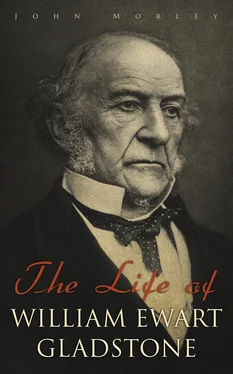Mr. Rawson was a good man, of high no-popery opinions. His school afterwards rose into considerable repute, and it had Dean Stanley and the sons of one or more other Cheshire families for pupils. But I think this was not so much due to its intellectual stamina as to the extreme salubrity of the situation on the pure dry sands of the Mersey's mouth, with all the advantages of the strong tidal action and the fresh and frequent north-west winds. At five miles from Liverpool Exchange, the sands, delicious for riding, were one absolute solitude, and only one house looked down on them between us and the town. To return to Mr. Rawson. Everything was unobjectionable. I suppose I learnt something there. But I have no recollection of being under any moral or personal influence whatever, and I doubt whether the preaching had any adaptation whatever to children. As to intellectual training, I believe that, like the other boys, I shirked my work as much as I could. I went to Eton in 1821 after a pretty long spell, in a very middling state of preparation, and wholly without any knowledge or other enthusiasm, unless it were a priggish love of argument which I had begun to develop. I had lived upon a rabbit warren: and what a rabbit warren of a life it is that I have been surveying.
My brother John, three years older than myself, and of a moral character more manly and on a higher level, had chosen the navy, and went off to the preparatory college at Portsmouth. But he evidently underwent persecution for righteousness' sake at the college, which was then (say about 1820) in a bad condition. Of this, though he was never querulous, his letters bore the traces, and I cannot but think they must have exercised upon me some kind of influence for good. As to miscellaneous notices, I had a great affinity with the trades of joiners and of bricklayers. Physically I must have been rather tough, for my brother John took me down at about ten years old to wrestle in the stables with an older lad of that region, whom I threw. Among our greatest enjoyments were undoubtedly the annual Guy Fawkes bonfires, for which we had always liberal allowances of wreck timber and a tar-barrel. I remember seeing, when about eight or nine, my first case of a dead body. It was the child of the head gardener Derbyshire, and was laid in the cottage bed by tender hands, with nice and clean accompaniments. It seemed to me pleasing, and in no way repelled me; but it made no deep impression. And now I remember that I used to teach pretty regularly on Sundays in the Sunday-school built by my father near the Primrose bridge. It was, I think, a duty done not under constraint, but I can recollect nothing which associates it with a seriously religious life in myself. 8
To these fragments no long supplement is needed. Little of interest can be certainly established about his far-off ancestral origins, and the ordinary twilight of genealogy overhangs the case of the Glaidstanes, Gledstanes, Gladstanes, Gladstones, whose name is to be found on tombstones and parish rolls, in charter-chests and royal certificates, on the southern border of Scotland. The explorations of the genealogist tell of recognitions of their nobility by Scottish kings in dim ages, but the links are sometimes broken, title-deeds are lost, the same name is attached to estates in different counties, Roxburgh, Peebles, Lanark, and in short until the close of the seventeenth century we linger, in the old poet's phrase, among dreams of shadows. As we have just been told, during the eighteenth century no traces of their gentility survives, and apparently they glided down from moderate lairds to small maltsters. Thomas Gladstones, grandfather of him with whom we are concerned, made his way from Biggar to Leith, and there set up in a modest way as corndealer, wholesale and retail. His wife was a Neilson of Springfield. To them sixteen children were born, and John Gladstones (b. Dec. 11, 1764) was their eldest son. Having established himself in Liverpool, he married in 1792 Jane Hall, a lady of that city, who died without children six years later. In 1800 he took for his second wife Anne Robertson of Dingwall. Her father was of the clan Donnachaidh, and her mother was of kin with Mackenzies, Munros, and other highland stocks. 9Their son, therefore, was of unmixed Scottish origins, half highland, half lowland borderer. 10With the possible exception of Lord Mansfield—the rival of Chatham in parliament, one of the loftiest names among great judges, and chief builder of the commercial law of the English world, a man who might have been prime minister if he had chosen.—Mr. Gladstone stands out as far the most conspicuous and powerful of all the public leaders in our history, who have sprung from the northern half of our island. When he had grown to be the most famous man in the realm of the Queen, he said, 'I am not slow to claim the name of Scotsman, and even if I were, there is the fact staring me in the face that not a drop of blood runs in my veins except what is derived from a Scottish ancestry.' 11An illustrious opponent once described him, by way of hitting his singular duality of disposition, as an ardent Italian in the custody of a Scotsman. It is easy to make too much of race, but when we are puzzled by Mr. Gladstone's seeming contrarieties of temperament, his union of impulse with caution, of passion with circumspection, of pride and fire with self-control, of Ossianic flight with a steady foothold on the solid earth, we may perhaps find a sort of explanation in thinking of him as a highlander in the custody of a lowlander.
Of John Gladstone something more remains to be said. About 1783 he was made a partner by his father in the business at Leith, and here he saved five hundred pounds. Four years later, probably after a short period of service, he was admitted to a partnership with two corn-merchants at Liverpool, his contribution to the total capital of four thousand pounds being fifteen hundred, of which his father lent him five hundred, and a friend another five at five per cent. In 1787 he thought the plural ending of his name sounded awkwardly in the style of the firm, Corrie, Gladstones, and Bradshaw, so he dropped the s . 12He visited London to enlarge his knowledge of the corn trade in Mark Lane, and here became acquainted with Sir Claude Scott, the banker (not yet, however, a baronet). Scott was so impressed by his extraordinary vigour and shrewdness as to talk of a partnership, but Gladstone's existing arrangement in Liverpool was settled for fourteen years. Sometime in the nineties he was sent to America to purchase corn, with unlimited confidence from Sir Claude Scott. On his arrival, he found a severe scarcity and enormous prices. A large number of vessels had been chartered for the enterprise, and were on their way to him for cargoes. To send them back in ballast would be a disaster. Thrown entirely on his own resources, he travelled south from New York, making the best purchases of all sorts that he could; then loaded his ships with timber and other commodities, one only of them with flour; and the loss on the venture, which might have meant ruin, did not exceed a few hundred pounds. Energy and resource of this kind made fortune secure, and when the fourteen years of partnership expired, Gladstone continued business on his own account, with a prosperity that was never broken. He brought his brothers to Liverpool, but it was to provide for them, not to assist himself, says Mr. Gladstone; 'and he provided for many young men in the same way. I never knew him reject any kind of work in aid of others that offered itself to him.'
JOHN GLADSTONE
It was John Gladstone's habit, we are told, to discuss all sorts of questions with his children, and nothing was ever taken for granted between him and his sons. 'He could not understand,' says the illustrious one among them, 'nor tolerate those who, perceiving an object to be good, did not at once and actively pursue it; and with all this energy he joined a corresponding warmth and, so to speak, eagerness of affection, a keen appreciation of humour, in which he found a rest, and an indescribable frankness and simplicity of character, which, crowning his other qualities, made him, I think (and I strive to think impartially), the most interesting old man I have ever known.' 13
Читать дальше









![William Frith - John Leech, His Life and Work. Vol. 1 [of 2]](/books/747171/william-frith-john-leech-his-life-and-work-vol-thumb.webp)


![William Frith - John Leech, His Life and Work, Vol. 2 [of 2]](/books/748201/william-frith-john-leech-his-life-and-work-vol-thumb.webp)